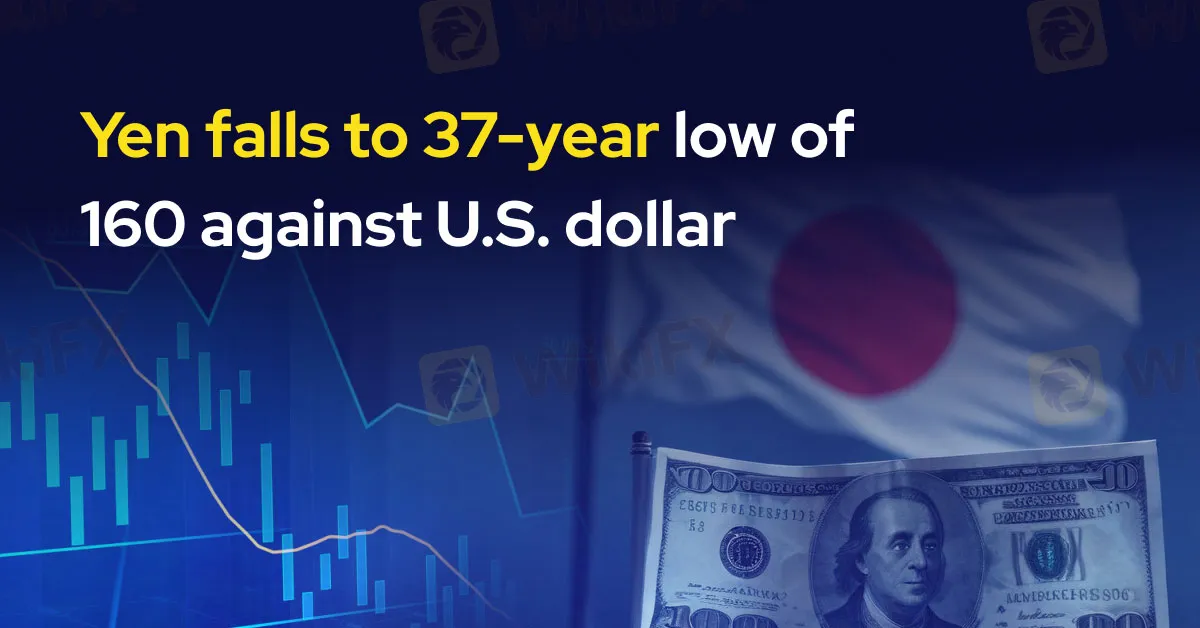简体中文
繁體中文
English
Pусский
日本語
ภาษาไทย
Tiếng Việt
Bahasa Indonesia
Español
हिन्दी
Filippiiniläinen
Français
Deutsch
Português
Türkçe
한국어
العربية
Yen falls to 37-year low of 160 against the U.S. dollar
Abstract:The Japanese yen plummeted below 160 against the US dollar on Wednesday, marking its weakest position in over 37 years. The steep decline has sent shockwaves through Tokyo, prompting urgent discussions on intervention strategies to stabilize the currency.

The Japanese yen plummeted below 160 against the US dollar on Wednesday, marking its weakest position in over 37 years. The steep decline has sent shockwaves through Tokyo, prompting urgent discussions on intervention strategies to stabilize the currency.
The yen's descent below the critical 160 threshold occurred amidst heightened concerns raised by Japanese and South Korean economic forecasters earlier this week. The situation escalated further after the United States added Japan to its watch list for currency manipulation, intensifying global scrutiny.
During London trading hours, the yen touched 160.39 against the dollar, a level unseen since 1986. The alarming drop triggered swift action from Japan's central bank on April 29, when the yen first breached the 160 mark, prompting immediate intervention measures.
Masato Kanda, Japan's vice finance minister, conveyed deep apprehension over the yen's rapid depreciation, emphasizing the government's vigilant monitoring of market trends and readiness to implement necessary countermeasures. “We have a serious concern about the recent rapid weakening of the yen,” Kanda stated, underscoring the urgency of the situation in remarks reported by Bloomberg.
The Japanese government has already committed substantial resources to curb the yen's freefall, spending approximately $61.3 billion in interventions between April 26 and May 29. These efforts involved selling treasuries to stabilize the currency amidst volatile market conditions.
Earlier attempts to bolster the yen, such as the Bank of Japan's first interest rate hike in 17 years in March, have not yielded the desired results. Despite these measures, the yen has continued to struggle against the strengthening US dollar, posing significant challenges for Japan's economic stability and global trade competitiveness.
As Tokyo deliberates on its next steps to address the currency's unprecedented decline, global markets remain attentive to developments that could impact broader economic landscapes. The yen's trajectory in the coming days will likely influence policy decisions in Japan and reverberate across international financial markets, underscoring the interconnected nature of global economies amidst evolving geopolitical dynamics.

Disclaimer:
The views in this article only represent the author's personal views, and do not constitute investment advice on this platform. This platform does not guarantee the accuracy, completeness and timeliness of the information in the article, and will not be liable for any loss caused by the use of or reliance on the information in the article.
Read more

Why Do Malaysians Keep Falling for Money Games?
Malaysia has seen a persistent rise in money game schemes, luring thousands of unsuspecting investors with promises of high returns and minimal risk. These schemes operate under various disguises, from investment clubs to digital asset platforms, yet they all follow the same fundamental principle—new investors fund the profits of earlier participants. Once the cycle collapses, the majority are left with devastating losses. Despite repeated warnings and high-profile cases, many Malaysians continue to fall victim. What drives this phenomenon?

Gold Prices Keep Skyrocketing: How Much Higher Can They Go?
In January 2025, gold prices continued to climb in global markets, reaching new historical highs.

Stronger Currency Shrinks Country's FX Reserves by $1.16bn
In January 2025, the Naira continued to appreciate in both the official and parallel markets, particularly against the backdrop of a decline in foreign exchange reserves.

Pepperstone Partners with Aston Martin Aramco F1 Team for 2025
Pepperstone joins Aston Martin Aramco F1 Team as Global Forex Partner, uniting innovation and excellence in trading and motorsport for 2025.
WikiFX Broker
Latest News
Woman Scammed Out of RM200,000 in Investment Fraud
XS.com Launches AI Insights to Transform Trading Behavior
Why Do Some Brokers Block Your Withdrawals?
FCA Cautions Against ALT-COINFX
Robinhood Halts Super Bowl Betting Contracts After CFTC Request
3-Day Online Scam Trap: Victims Lose $200K—Don't Be Next!
Japan's January PMI has been released, investors need to pay attention to these points!
Investment Scam on Telegram: How a Woman Lost Over RM65,000
Spotting Red Flags: The Ultimate Guide to Dodging WhatsApp & Telegram Stock Scams
WikiFX Review: Why so many complaints against QUOTEX?
Currency Calculator


